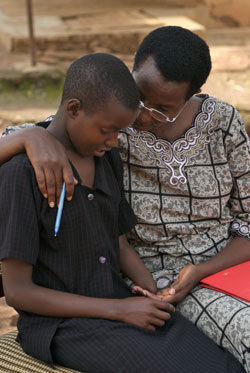 Smiling, her eyes respectfully averted, a young girl walks into the office of a local Compassion program in Kigali, Rwanda, and greets Dativa Muteteli. The girl, Thabitha, a survivor of the Rwandan genocide of 1994, has a deep scar on her forehead and is missing her left hand and wrist. Dativa, a tall, strong woman, pats her affectionately, and they begin to talk.
Smiling, her eyes respectfully averted, a young girl walks into the office of a local Compassion program in Kigali, Rwanda, and greets Dativa Muteteli. The girl, Thabitha, a survivor of the Rwandan genocide of 1994, has a deep scar on her forehead and is missing her left hand and wrist. Dativa, a tall, strong woman, pats her affectionately, and they begin to talk.
Thabitha responds to the questions quietly, looking away. Dativa, a health specialist for Compassion who is trained in trauma counseling, pulls the girl closer, raises her chin so their eyes meet, and asks more questions. Thabitha is struggling in school, and Dativa wants to know why.
“I know you are clever. So what is the problem?”
Rather than being intimidated by Dativa’s question, Thabitha leans into it. She trusts Dativa — adores her, in fact. Despite her answer of “I don’t know,” her smile broadens and her voice becomes stronger.
Thabitha is just one of four young people Dativa will spend time with today. Sometimes they will meet in the shade of a tree, other times in the safety of their homes. The ages and stories vary, but all lost family members in the genocide — and all find comfort with Dativa.
Death, Life and a New Beginning
Dativa, born in Uganda, is a registered nurse. She says she “fell in love with serving the poor” of Rwanda when she became a Compassion health worker in 1988. As violence against the Tutsi people in Rwanda steadily increased and hundreds of thousands of people were murdered in the following years, it was, Dativa believes, her dedication to children that saved her life during the genocide.
“Someone would threaten me, and someone else would say, ‘Dativa is helping our children. Her death means their death.’”
But on April 13, 1994, she found herself, along with her three young sons, on her knees waiting to be killed — and there was no one to speak out for her.
Courageously, one of her sons, just 7 years old at the time, pleaded with a soldier who reversed the cruel death sentence and took the family back to their home. Terrified, for three weeks they huddled outside in a shelter they made from bricks, venturing out only at night to eat avocados from their tree and drink rainwater from an old bucket.
Eventually they escaped to Uganda, but Dativa’s love for Rwanda’s poor led her back in September 1994 as a trained trauma counselor for Compassion-assisted Rwandan children.
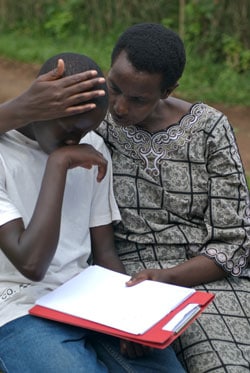 For years Dativa has heard the same heartbreaking stories of children who survived the genocide. “The hopeless ones are my friends,” she says. Stories like that of Eric.
For years Dativa has heard the same heartbreaking stories of children who survived the genocide. “The hopeless ones are my friends,” she says. Stories like that of Eric.
Dativa asks Eric to write about his memories of his mother’s death and the genocide. Eric was being carried on his mother’s back when she was killed.
He writes several lines and then stares off into the distance. Dativa asks if he will share what he has written. Quietly, he begins to read from his paper — memories of neighbors’ deaths, of his own mother’s murder — soon he is in tears. He leans his head on Dativa’s shoulder and says, “I can’t tell you anymore today.”
For a while she simply sits there while Eric cries on her shoulder. The tears eventually stop, but Eric is in no hurry to move.
Then the two begin to talk about the future. Eric has big plans, “to be a leader — maybe even a president.” When Dativa gently asks him to tell her more, he says, “I want to remove all the past … so that no one else has to live my life.”
Back at her desk in the Compassion office, Dativa thinks of the hurting — yet healing — children she counsels and considers Rwanda’s future. Many of these children are well-adjusted adults now, making positive, life-changing impacts on their families and communities.
“I think we are moving back to hope. He [Eric] is a perfect example. Despite watching them kill his mother — despite so many things — Eric’s ambition is to be a leader. A good leader who will remove the past. Instead of saying, ‘I want revenge,’ he says, ‘I want change.’ How can you fail to get hope from such a person? He is a hero.”
About the Author: Phoebe Graves has worn many hats in her 13 years with Compassion, including those of photographer and writer, hosting visitors and training communicators in the field, and developing tools to help Compassion better serve implementing church partners.
For nearly four years, she lived in Kigali, Rwanda, and worked in Compassion’s Africa regional office. Her favorite hat to wear is still the one that lets her tell the stories of the amazing children, families and child development staff she meets around the world.

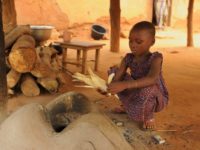
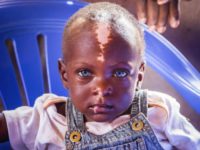
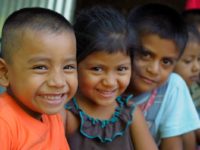
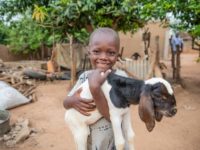


4 Comments |Add a comment
Thank you for sharing this. I didn’t know about the genocide when it was happening but learned a few years after the fact. When I started sponsoring a child, i chose one from Rwanda. My child was born 5 years after the genocide so she can’t have any direct memories of it, but I’m sure people she knows do. i don’t know which side of the line (aggressor or victim) her family would have been on. it doesn’t matter. I just know that both sides need compassion. I hate it that I was ignorant at the time… sponsoring her has been a joy since 2007. When i pray for her, I pray that she will be an instrument of healing.
Love this sweet story of sharing life’s hurts and tragedies!
Wow!!Mama Dativa,thanks for your passion in taking time to listen to those vulnérable children,wish I would met someone like You in 10 past years.
Wow, this is so powerful. Tears in my eyes as I feel not only their desperate pain, but also their joy and their hope. God is moving to redeem these young lives. Thank you for this post.